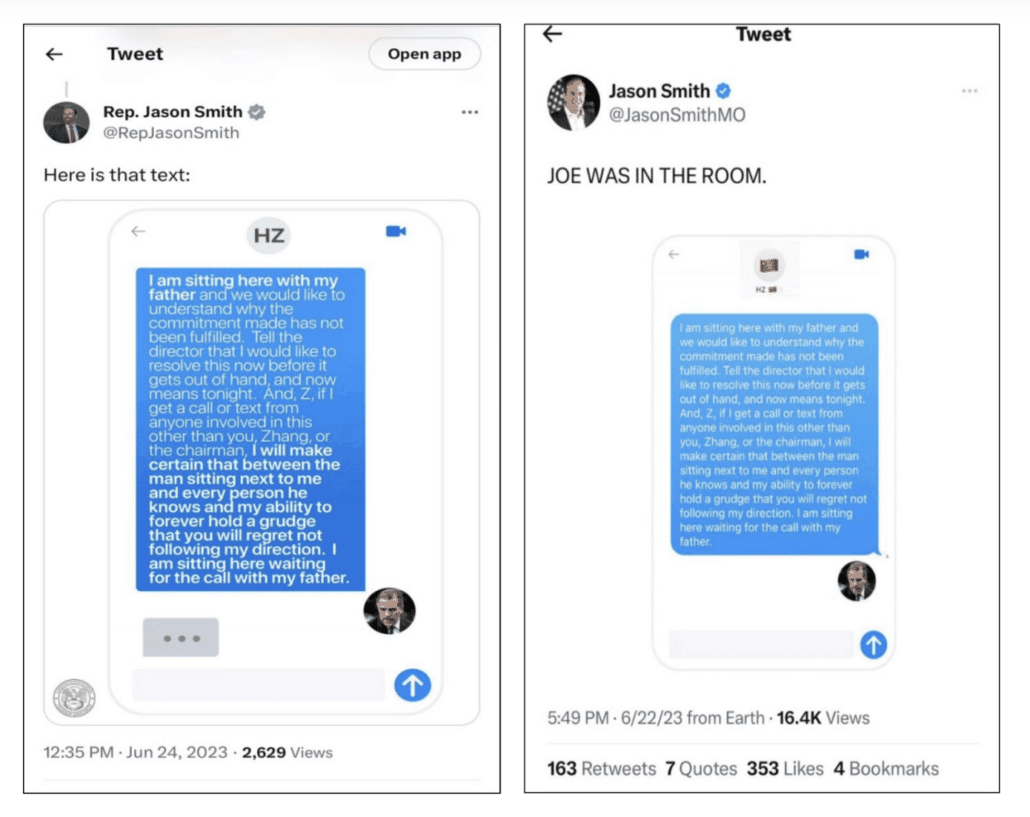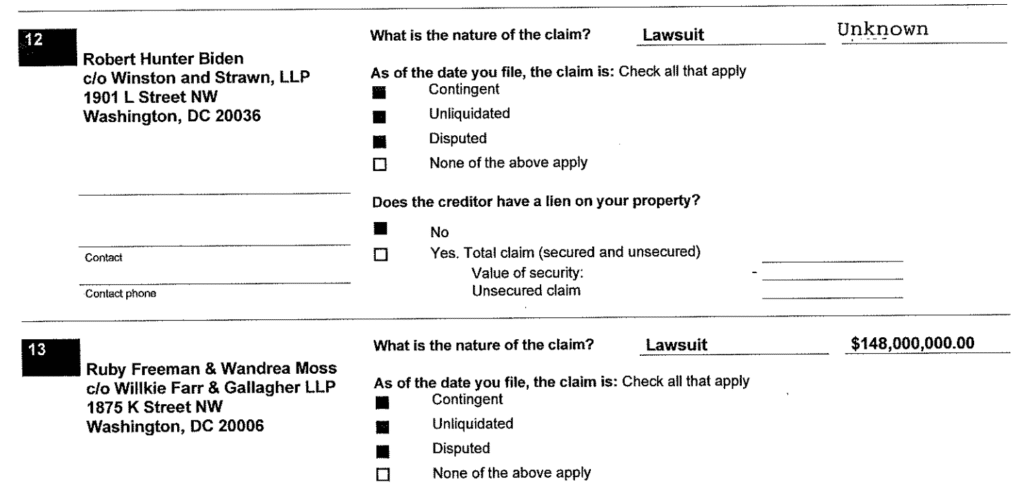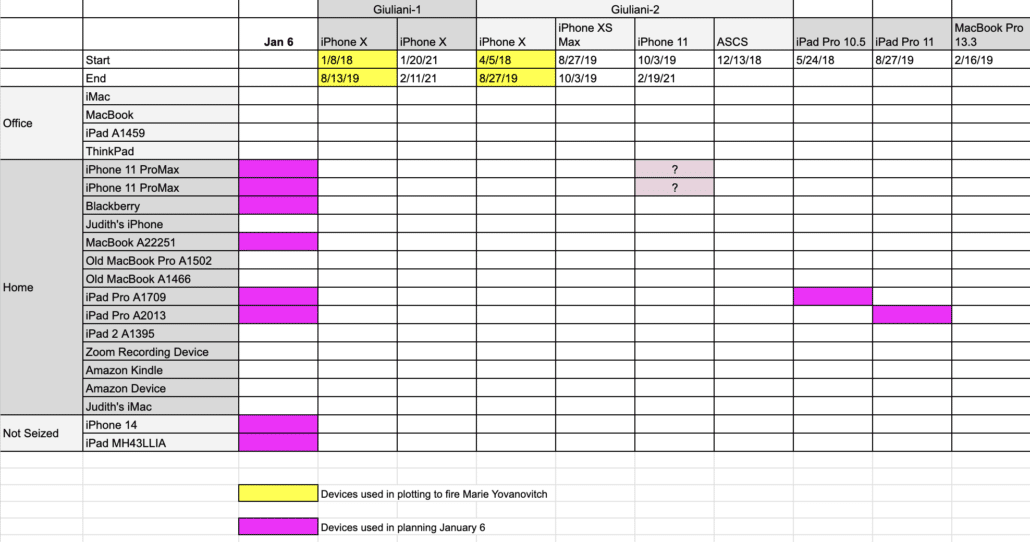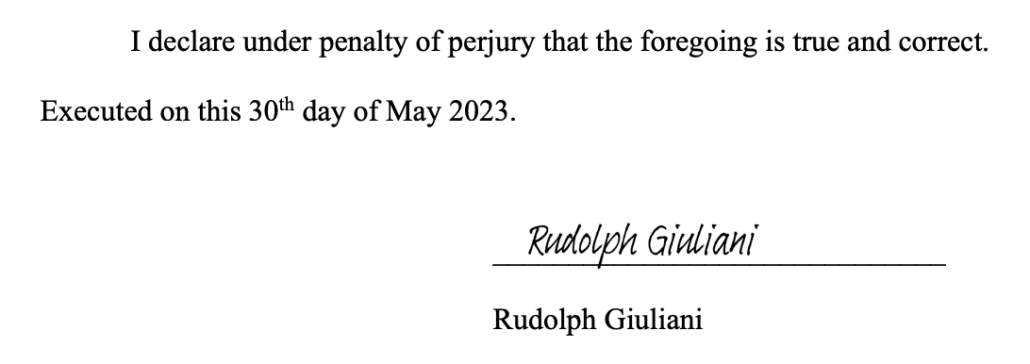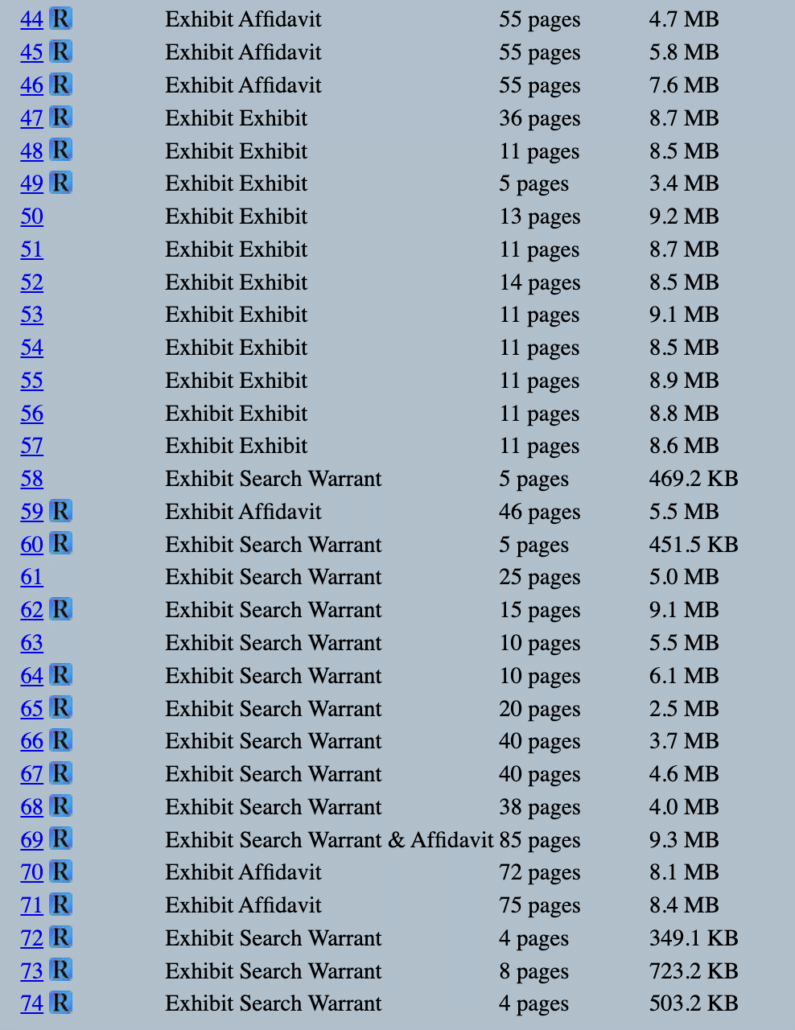Update: Given confusion mentioned in comments, I thought I’d do another handy dandy chart to describe the motions to dismiss, like I did for Trump’s. This post addresses the MTD Selective Vindictive Separation of Powers.
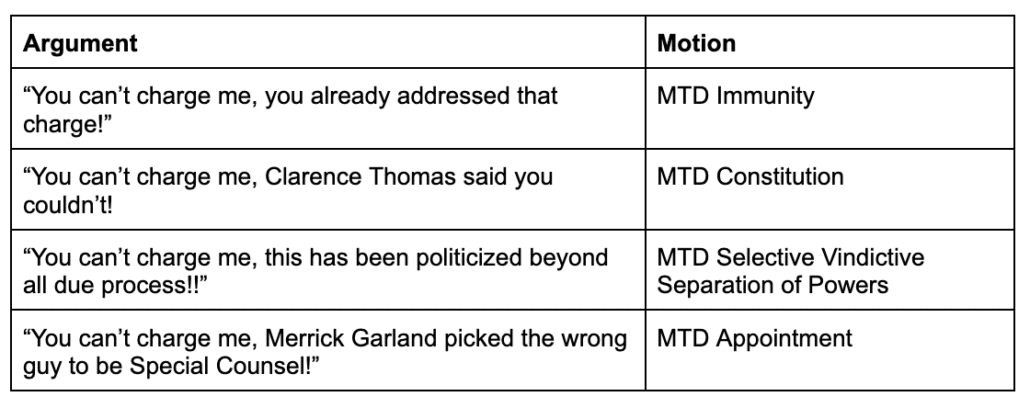
Abbe Lowell’s motion to dismiss the gun charges against Hunter Biden for selective and vindictive prosecution and violation of separation of powers only asks for discovery in passing.
Often, MTDs for selective prosecution are requests for discovery. For comparison, in a bid to argue that Jan6er David Judd was charged more harshly than Portland rioters, his excellent public defender, Elizabeth Mullin, conceded that she did not yet have proof he was treated worse because he was a Trump supporter, but then asked for six specific things to prove the case.
Mr. Judd does not yet contend the allegations below are sufficient for dismissal of the charges against him. However, they are sufficient for the Court to compel specific discovery regarding disparities in charging decisions.
[snip]
(1) Communication between the Department of Justice (“Main Justice”) and the U.S. Attorney’s Office for the District of Oregon regarding prosecution of defendants arrested in connection with protests in 2020.
(2) Communication between management at the U.S. Attorney’s Office for the District of Oregon and line Assistant U.S. Attorneys regarding prosecution of defendants arrested in connection with protests in 2020.
(3) Communication between the Department of Justice (“Main Justice”) and the U.S. Attorney’s Office for the District of Columbia regarding prosecution of defendants arrested in connection with the January 6 demonstrations at the U.S. Capitol.
(4) Communication between management at the U.S. Attorney’s Office for the District of Columbia and line Assistant U.S. Attorneys regarding prosecution of defendants arrested in connection with the January 6 demonstrations at the U.S. Capitol.
(5) Communication between the Department of Justice (“Main Justice”) and the U.S. Attorney’s Office for the District of Columbia regarding prosecution of the D.C. Fireworks Defendant.
(6) Communication between management at the U.S. Attorney’s Office for the District of Columbia and line Assistant U.S. Attorneys regarding prosecution of the D.C. Fireworks Defendant.
Mullin’s bid didn’t work. Judge Trevor McFadden ruled that January 6 was different than Portland — though he did use her argument to treat Jan6ers leniently at sentencing.
Compare that statement with this one, from page 50 of Abbe Lowell’s 60-page selective and vindictive MTD, where he asserts that this is the exceptional case where a defendant can prove vindictive prosecution without discovery.
Cases where a defendant can show actual vindictiveness without discovery may be few and far between, but this is surely one.
Lowell closes the entire brief with a similar statement, footnoted with the assertion that, “Were there to be any doubt at all, the basis for discovery and an evidentiary hearing has well been established.”
“[O]ur society is not bettered by law enforcement that. . . is not conducted in a spirit of fairness or good faith.” Banks, 383 F. Supp. at 397. This prosecution falls in that category, and the Court should dismiss the indictment. 109
109 As stated through this and the other motions to dismiss, the record available to the Court supporting dismissal is extraordinary. Were there to be any doubt at all, the basis for discovery and an evidentiary hearing has well been established.
This argument — that if Hunter Biden hasn’t met his burden for outright dismissal, then surely he should be granted discovery — is four other times relegated to a footnote.
One such footnote appears in a passage purporting to lay out the legal standards that govern this issue, in which Lowell cites a bunch of precedents from other circuits about dismissal in case of selective, vindictive, or separation of powers violations.
When a prosecution is selective, vindictive, or violates separation of powers, the tainted charges must be dismissed. See id. at 700 (“Preservation of this system of checks and balances requires the courts to invalidate actions that. . . undermine the authority and independence of one or another coordinate Branch.”) (citations omitted); In re Aiken Cnty., 725 F.3d 255, 264 n.7 (D.C. Cir. 2013) (“If the Executive selectively prosecutes someone based on impermissible considerations, the equal protection remedy is to dismiss the prosecution . . . .”).42
42 Where a defendant has not carried his burden, but has demonstrated a “colorable claim,” discovery and an evidentiary hearing should be permitted. United States v. Heidecke, 900 F.2d 1155, 1159 (7th Cir. 1990); United States v. Jones, 159 F.3d 969, 978, n.8 (6th Cir. 1998) (granting discovery to give the defendant “the opportunity to move to dismiss the indictment” for selective prosecution). See Mr. Biden’s Discovery Mot (filed concurrently). [my emphasis]
Armstrong, the precedent making it almost impossible for a defendant to get discovery, the one that Principal Senior Assistant Special Counsel Leo Wise cited 48 times in his bid to defeat subpoenas, does not appear in this section (though it does appear in several other places and in the discovery motion).
As this footnote does, two other such footnotes specifically cite a motion for discovery and evidentiary hearing filed the same day. In those other two instances, Lowell cites the line in this NYT article describing that David Weiss told an associate that he preferred not to bring any charges because the average American would not be charged for these crimes.
[T]he New York Times reported that “Mr. Weiss told an associate that he preferred not to bring any charges, even misdemeanors, against Mr. Biden because the average American would not be prosecuted for similar offenses.” 9
9 Michael Schmidt et al., Inside The Collapse Of Hunter Biden’s Plea Deal, N.Y. Times (Aug. 19, 2023), https://www.nytimes.com/2023/08/19/us/politics/inside-hunter-biden-plea-deal.html. The article does not disclose the source. The account is most likely true considering the charging statistics, DOJ enforcement policies described below, and Mr. Weiss’s initial reluctance in prosecuting Mr. Biden on this charge. If it is true, it is extremely damning evidence of discriminatory prosecution. Thus, to the extent there is any doubt, the Court should grant Mr. Biden’s request for discovery and an evidentiary hearing. See Mr. Biden’s Discovery Mot. (filed concurrently).
[snip]
DOJ confirmed its own improper motive when, under fire from Congress and the public, it resorted to a rarely used gun charge that reports indicate Special Counsel Weiss himself admitted would not have been brought against the average American.85
85 Michael S. Schmidt et al., Inside The Collapse Of Hunter Biden’s Plea Deal, N.Y. Times (Aug. 19, 2023), https://www.nytimes.com/2023/08/19/us/politics/inside-hunter-biden-plea-deal.html. As noted above, the article does not disclose the source, and to the extent there is any doubt about the veracity of the claim, the Court should grant Mr. Biden’s request for discovery and an evidentiary hearing. See Mr. Biden’s Motion for Discovery and an Evidentiary Hearing (filed concurrently). [my emphasis]
I have repeatedly predicted we’d see this language in Hunter’s selective prosecution motion, because it provides what virtually no defendant ever has: proof that the prosecutor himself recognized he was selectively prosecuting a defendant.
If Lowell can find these witnesses — experts on gun crimes who said Hunter was charged only because he was prominent and a Weiss associate whom Weiss purportedly told he knew that average Americans would not be prosecuted for such crimes –and get them to testify, then he would have what virtually no other defendant would: Proof that the prosecutor who brought the charge knew that similarly situated defendants would not be charged, but charged the defendant anyway.
But I assumed the proof that David Weiss had said that would require witness testimony.
Perhaps it doesn’t.
Consider that the last instance (in this filing) where Lowell relegates a request for discovery and an evidentiary hearing to a footnote, he makes an assertion — that DOJ has long believed that Hunter’s rights must take precedence over efforts by Trump to interfere in this prosecution — that he does not cite.
But as DOJ itself has long believed, Mr. Biden’s rights must come first and efforts by members of Congress and the former President to interfere have tainted this prosecution beyond purification. As a result, there is no constitutional option but to dismiss this case.40
40 If the Court has any doubt that the material set out in this motion is sufficient to warrant outright dismissal of these charges, it should permit discovery and conduct an evidentiary hearing. Mr. Biden has already sought discovery from DOJ and information from third-parties with knowledge of former President Trump’s influence, and DOJ has not responded to the requests and filed an opposition for this information to be disclosed. [my emphasis]
To be sure, we know that David Weiss’ investigative team, led by Lesley Wolf, made repeated efforts — not always successful — to shield the investigative team from Trump’s efforts to interfere.
For example, Tim Thibault told the House Judiciary Committee that one reason he shut down Peter Schweizer as a source was because then-Supervisory Special Agent Joe Gordon reached out, insinuating they already had laptop-based evidence, and said that if a case against Hunter Biden ever went to trial and Hunter’s attorneys found the FD-1023 from Schweizer that the Washington Field Office had shared with the Hunter team, it would give Hunter’s attorneys ammunition.
A And then fast-forward to sometime in October, I received an unsolicited call —
Q Uh-huh.
A — from the supervisor of the Hunter Biden case. I knew him because he had been assigned to Washington Field Office as the case agent.
[snip]
A And I said: Okay. What are your concerns? And basically said: Look, the information isn’t of any value to us, number one. My — I deduced from everything he said that they already had the information —
Q Uh-huh.
A — from some other source, some other channel, maybe not a human source but some other channel. He also said that that person was politically connected —
Q Uh-huh.
A — and partisan in his view and he was concerned about the source being on media platforms.
[snip]
A So I was getting a call from this supervisor. And my — my takeaway was we don’t need your source reporting and also: Why are you sending a file to our — to our case file that we didn’t know about? Right? So Washington Field Office wrote this 1023 and it went to headquarters and it went to Baltimore.
[snip]
A I understand you don’t need the reporting anymore. I understand that if this goes to trial, Hunter Biden’s attorney —
Q Uh-huh?
A — could have some ammunition.
Regarding that very same laptop, Gary Shapley complained to Congress that Weiss’ office had prevented Joseph Ziegler from seeing a report addressing the “quality and completeness of imaged/recovered information from the hard drive.”

Ziegler himself complained that he hadn’t been able to interview Tony Bobulinski — the guy whom Donald Trump personally hosted at an election debate and who subsequently had a clandestine meeting with Trump’s chief of staff — because, prosecutors told him, Bobulinski, “was not viewed as a credible witness.”
In investigative team meetings that occurred after this, I can recall that agents on the investigative team brought up on multiple occasions to the assigned prosecutors that they wanted to do an interview of Bobulinski with the assigned case agents. I can recall being told that they would think about it and then ultimately being told there was no need for the team to interview Bobulinski and that Bobulinski was not viewed as a credible witness.
And Scott Brady not only confirmed Gary Shapley’s claim that Lesley Wolf repeatedly refused to be briefed by Scott Brady’s team because she didn’t want dirt from Rudy Giuliani, but also that David Weiss had to — and did — intervene before Wolf would share information about her investigation with Brady.
Okay. So, looking at paragraph four on page 2, as it continues onto page 2, the second full sentence, it says: The prosecution team discussed the Hunter Biden related work of the Pittsburgh USAO on several occasions, as it was a line item on the recurring prosecution team’s call agenda for a long period of time. Assistant U.S. Attorney Lesley Wolf told us the Pittsburgh USAO and U.S. Attorney Scott Brady requested to brief the Delaware USAO’s Hunter Biden’s investigative team on multiple occasions, but they were turned down by AUSA Wolf and the Delaware USAO. Is it accurate that you had requested multiple times, you or your office, to brief the Delaware U.S. Attorney’s Office?
A Yes.
[snip]
Chairman Jordan. Got it. Got it. Now, also, based on what you said, throughout the process, you said that the Delaware U.S. Attorney’s Office wasn’t willing to cooperate, so much so that you had to send interrogatories?
Mr. Brady. Yes, we had conversations, asked for communication and a flow of information, mostly one way from us to them, but also, as I testified, we wanted to make sure we weren’t duplicating what they were doing. They would not engage. And so finally, after me calling Mr. Weiss and saying can you please talk to your team, this is important, this is why we want to interact with them, the response that we got back is you can submit your questions to our team in written form, which we did.
This is an important instance where, at least per Scott Brady, Lesley Wolf was attempting to prevent the politicization of the case, but David Weiss overruled her.
Finally, Shapley also provided documentation of his own complaint that, “This investigation has been hampered and artificially slowed by various claims of potential election meddling.”
There are abundant examples where Lesley Wolf attempted to shield the investigative team from Trump’s efforts to intervene. Lowell cites none of them, nor other public evidence, such as Ziegler’s testimony that there were emails (probably his original supervisor’s memorialization of Trump’s improper influence). Instead, he asserts without citation that DOJ has long believed that Hunter’s rights must come first.
I’m mindful that, in the exhibits accompanying his motion to dismiss because the diversion immunizes Hunter Biden from further charges, Lowell also didn’t include the bulk of documentation that NYT and Politico appear to have relied on for stories about how the plea deal collapsed.
That is, it’s possible that one of the documents that NYT received records someone — possibly Wolf — sharing with Chris Clark the explanation that Weiss really wanted to avoid any charges, even misdemeanors. If Abbe Lowell has that document, he’s playing coy.
Indeed, that’s an important dynamic in the motion for discovery and an evidentiary hearing. In a footnote (footnote six in this post), it purports to support both the selective and vindictive motion and the immunity one.
1 To the extent the Special Counsel disputes the facts laid out in Mr. Biden’s Motion to Dismiss the Indictment Based on Immunity Conferred By His Diversion Agreement and the Declaration of Christoper Clark (his former counsel), filed contemporaneously, as noted in that Motion at Note 1, an evidentiary hearing where all the participants to the negotiations (including U.S. Attorney David Weiss) should be held on that motion as well.
The footnote it cites in the immunity motion (footnote seven) asks Judge Maryanne Noreika, if she needs more proof regarding the immunity conferred by the diversion agreement, to include David Weiss (and “responsible members of his prosecution team,” which would include Wolf) among the witnesses.
If the Court believes that parol evidence should be considered, Mr. Biden requests an evidentiary hearing in which all participants in the negotiation of the Diversion Agreement, including Mr. Weiss and the responsible members of his prosecution team, can be called as witnesses to address the extensive recapitulation provided in Mr. Clark’s Declaration.
Even in the discovery motion, Lowell doesn’t provide a list of things like the one that David Judd’s attorney included in hers.
Instead, he simply points to the October 8 and November 15 discovery requests he already made and describes that Weiss’ team responded with silence.
On October 8, 2023 and November 15, 2023, as well as in follow-up correspondence on November 15, Mr. Biden wrote to the prosecution with tailored and enumerated discovery requests, many of which are routine in a criminal defense case such as this one. 2 The October 8 requests included customary Rule 16 discovery requests and 19 specific requests under Brady, Agurs, Giglio, and the Fifth Amendment, Rule 26/Jencks Act and similar requests. These requests have largely been met with silence and will be the subject of a motion to compel should this case proceed. However, the November 15, 2023 requests as well as the motion for Rule 17 subpoenas filed that same day seek information bearing directly on the issues addressed in the motions to dismiss filed concurrently herewith—selective and vindictive prosecution, political interference, and separation of powers concerns. The prosecution has not responded to or addressed these requests by Mr. Biden in any fashion. During a meet and confer phone call on December 1, 2023, Mr. Biden’s counsel even asked Messrs. Wise and Hines for a status update of the prosecution’s discovery, and specifically whether the government intended to make any additional productions in the near-term or respond to our various discovery request letters, to which Mr. Hines responded that the government would “let the discovery stand for itself.”3 [my emphasis]
The November 15 discovery request is similar to the subpoena request from the same day (which Lowell invokes in footnote 3), though it includes any communications discussing an investigation of Hunter that involve Geoffrey Berman as well.
1. All documents and records reflecting communications from January 20, 2017 to the present (the “Relevant Time Period”) to, from, between, or among Donald J. Trump, William P. Barr, Geoffrey Berman, Scott W. Brady, Richard Donoghue, or Jeffrey A. Rosen relating to or discussing any formal or informal investigation or prosecution of Hunter Biden, or a request thereof.
2. All documents and records reflecting communications from the Relevant Time Period to, from, between, or among Donald J. Trump, William P. Barr, Geoffrey Berman, Scott W. Brady, Richard Donoghue, or Jeffrey A. Rosen and any Executive Branch official, political appointee, Department of Justice official, government agency, government official or staff person, cabinet member, or attorney for President Trump (personal or other) discussing or concerning Hunter Biden.
SDNY investigated both Hunter and James Biden as part of their investigation into Patrick Ho and Gal Luft, so there may be communications between Berman and Weiss on that topic. Berman’s investigation of Lev Parnas would have covered the October 2019 meeting at which Parnas believed he’d receive laptop-based dirt from a Burisma associate. Plus, Berman would have been told to stand down on Rudy Giuliani’s December 5, 2019 meeting with Andrii Derkach, in deference to Richard Donoghue. His book describes that those discussions were quite heated.
The October 8 request is — as Lowell claims — more conventional (at least on its face). It asks for the evidence Weiss has about Hunter’s addiction. It asks for affidavits in support of warrants. And some of that — a request for communications on the drafting of the plea agreement and stats on prosecutions of these gun charges — definitely would support Lowell’s motions to dismiss.
There are unsurprising additions, such as any communications regarding leaks to the press, including through cut-outs (which is how I think the October 6, 2022 leak happened).
Any documents and/or information reflecting communications between anyone in your Office or any member of the investigative team or their supervisors (including FBI and IRS agents) with any member of the press or public concerning the investigation, and any documents and/or information reflecting leaks of information concerning the investigation or prosecution of Mr. Biden to the press, any private person, or any government official or employee who was not authorized to receive such disclosure.
Sure, this likely aims to discover whether Shapley and Ziegler had any role, including through cut-outs, in the leaks in this case. But as I noted in my post on that NYT story, there are several claims in it attributed to a “senior law enforcement official with knowledge of the situation” who claimed to have knowledge of things only David Weiss would know.
Then there are things that look innocuous, but might be particularly problematic for Weiss. Given my suggestion above that there may be documentation of a claim that Weiss told an associate he didn’t want to charge Hunter at all, a collection of all the communications anyone in his office had with lawyers for Hunter might pose hazards for this prosecution.
Any documents and/or information reflecting communications between anyone in your Office and any attorney representing Mr. Biden from the onset of the investigation to June 20, 2023.
Normally, when someone takes over a case from a prior defense attorney, they usually get the case file from their predecessor. Lowell would be expected to ask Clark for this. But there are at least two other sets of lawyers who would have been involved (including an investigative interview with George Mesires), which would justify this request. Complying with this request would involve Principal Senior Assistant Special Counsel Leo Wise seeing communications that David Weiss may have attempted to use him to sheep dip from this prosecution.
Then there’s a request for 302s.
A. Any draft FBI-302s, FD-1023s or interview memoranda describing such interviews.
B. Any requests by investigating agents or members of the Department of Justice to edit, revise, or otherwise change the content of any 302 or interview memorandum
This would include the FD-1023s from Peter Schweizer and the Zlochevsky informant, the 302 from Luft, as well as the draft 302 from Tony Bobulinski (and any record that DOJ intervened to prevent its completion), at least three of which Wolf attempted to keep from investigators.
Weiss may be imaging he can withhold these based on a claim that the gun charge doesn’t implicate these documents pertaining to politicized witnesses, and normally he’d be right. Except Judge Noreika already permitted Jason Smith to file an amicus, including protected grand jury materials, based in part on the argument that this has gotten so much publicity already. Plus, in both Jack Smith’s prosecutions of the former President and the serial treatment of Mike Flynn, there is arguably support for sharing such information (I asked Weiss’ spox if his team would adhere to the discovery approaches in those cases and got no response whatsoever to my question).
Finally, there are communications with Congress.
Any documents and/or information reflecting communications between any Member of Congress, Committee or Subcommittee of Congress, or congressional staff and any person at the U.S. Department of Justice, including your Office, concerning the investigation or prosecution of Mr. Biden, including the decision to bring any particular charges.
This would include the letter, cited in the selective MTD, that Chuck Grassley and Ron Johnson sent in 2021 regarding any gun charges against Hunter.
It would include the many letters sent to Merrick Garland.
It would also include the transcripts of the many interviews — including Brady, Thibault, from Lesley Wolf last week, and from Weiss himself — Jim Jordan did. At least some of those were shared with DOJ for an accuracy review. And in Weiss’ transcript, he made a claim that has already been rebutted in Chris Clark’s declaration, in which he described Weiss’ First AUSA saying there was no ongoing investigation into Hunter Biden.
This is an area where the Jack Smith precedent may be pertinent: in a response to Trump’s demand to subpoena Congress (which Lowell doesn’t do), Thomas Windom revealed that Smith shared 260 January 6 Committee transcripts with Trump. Jim Jordan has spent five months quizzing almost every member of the Hunter Biden investigative team about whether there was political interference on this case, which seems to make it relevant for any litigation about Congress’ usurpation of David Weiss’ role.
Normally, none of this would be discoverable and Principal Senior Assistant Special Counsel Leo Wise is likely to come back and say it is Jencks, which only will be relevant if these witnesses testify.
As I keep saying, normally none of this goes anywhere. I am assuredly not saying this will work.
What I am trying to lay out is that Lowell is going about via different tactics, in part by arguing this known proof of political interference is Brady (Brady about Brady!), not just evidence of selective prosecution hidden behind 48 invocations of Armstrong.
If Lowell prevails with his argument — his strongest argument, in my opinion — that Hunter is immune from prosecution on the gun charges, none of this may matter (until Lowell makes the same argument in Los Angeles, before a different Trump appointed judge). But once you get into the argument about improper influence on this case, David Weiss might begin to hear footsteps.

